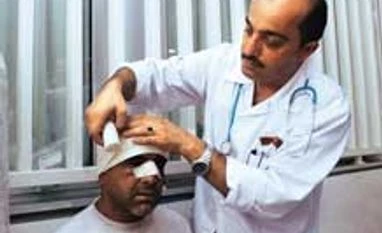Even after two decades, acronym 'BIMARU' used to define underdevelopment and poor social indices in Bihar, Madhya Pradesh, Rajasthan and Uttar Pradesh seems to ring true as a recently published study by Indian Institute of Management (IIM) Ahmedabad has picked holes in the health care facilities provided by the states.
The study by IIM mainly discusses aspects of infrastructure, manpower and operational challenges faced in effective provisioning of specialist services through rural health facilities in these states.
"The findings reveal significant dearth of specialist doctors with their concentration at the district level," said the study done by assistant professor Shreekant Iyenger at Institute of Law in Nirma University and Ravibndra Dholakiya, professor of economics at IIM -Ahmedabad.
It pointed out that the efforts made by the government for providing additional manpower support for these services are also not giving desired results.
One area where the BIMARU states lag significantly is availability of all four specialists including Gynaecologist, Paediatricians, Surgeons and Physicians at Community Health Centres (CHCs) or District Hospitals (DHs).
"While it is observed that Bihar (34.3 per cent) has a relatively greater proportion of such CHCs, all other states like Rajasthan (8.3 per cent), MP (1.2 per cent) and UP (one per cent) perform quite poor in terms of presence of all four specialists at CHCs," said the study.
As on March 2014, Bihar and UP have only 0.83 and 2.91 specialist doctors per million population in the CHCs, DH and Sub district hospitals (SDHs).
While, states like Rajasthan (11.52) and MP (4.36) were in a relatively better condition when compared with national average of 3.98 specialist doctors per million population in CHCs.
The study by IIM mainly discusses aspects of infrastructure, manpower and operational challenges faced in effective provisioning of specialist services through rural health facilities in these states.
"The findings reveal significant dearth of specialist doctors with their concentration at the district level," said the study done by assistant professor Shreekant Iyenger at Institute of Law in Nirma University and Ravibndra Dholakiya, professor of economics at IIM -Ahmedabad.
Also Read
"Moreover, there are severe mis allocations of the specialist doctors and lack of manpower support, equipment and basic infrastructure within the public health system causing serious challenges in effective provisioning of specialist services for maternal and child health care," said the study.
It pointed out that the efforts made by the government for providing additional manpower support for these services are also not giving desired results.
One area where the BIMARU states lag significantly is availability of all four specialists including Gynaecologist, Paediatricians, Surgeons and Physicians at Community Health Centres (CHCs) or District Hospitals (DHs).
"While it is observed that Bihar (34.3 per cent) has a relatively greater proportion of such CHCs, all other states like Rajasthan (8.3 per cent), MP (1.2 per cent) and UP (one per cent) perform quite poor in terms of presence of all four specialists at CHCs," said the study.
As on March 2014, Bihar and UP have only 0.83 and 2.91 specialist doctors per million population in the CHCs, DH and Sub district hospitals (SDHs).
While, states like Rajasthan (11.52) and MP (4.36) were in a relatively better condition when compared with national average of 3.98 specialist doctors per million population in CHCs.



)